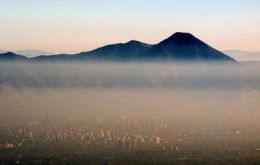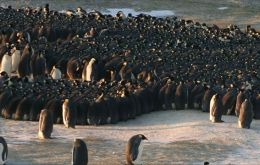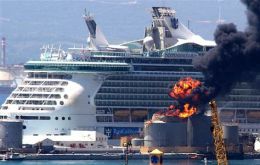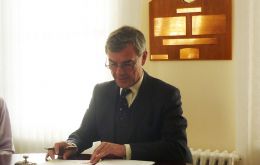MercoPress. South Atlantic News Agency
Environment
-
Saturday, June 4th 2011 - 06:31 UTC
Chile’s capital survives driest May in 43 years: respiratory diseases outbreak

As any Santiago de Chile resident could attest, it was all sun and no rain this past May, creating a hazardously dry environment and increasing already worrying levels of pollution.
-
Friday, June 3rd 2011 - 18:01 UTC
Penguins’ winter huddle clusters are all the time on motion to keep warm

The mystery of how penguins stay warm while they huddle has been revealed by an international team of scientists. Emperor penguins survive the tough Antarctic winters by forming tightly packed clusters - but scientists have pondered how penguins on the outside stay as cosy as those in the centre.
-
Thursday, June 2nd 2011 - 09:29 UTC
New York sues Federal government on natural gas drilling in Delaware river basin

New York's attorney general is suing the federal government to compel a full environmental review of proposed regulations for natural gas drilling in the Delaware River Basin.
-
Thursday, June 2nd 2011 - 04:15 UTC
Brazil gives definitive approval to world’s third largest hydroelectric dam project

Brazil's environment agency gave its definitive approval Wednesday for construction of the Belo Monte hydroelectric dam, a controversial 17 billion US dollars project in the Amazon that has drawn criticism from native Indians and conservationists.
-
Thursday, June 2nd 2011 - 03:59 UTC
Uruguay rejects Zamin Ferrous mining project environment impact report

Uruguay made a long list of objections to the environment impact assessment study presented by the Aratiri mining project which plans open-pit extraction of magnetite (ferrous component) from vast resources in Valentines, the heart of the South American country.
-
Wednesday, June 1st 2011 - 18:02 UTC
Falkland Islands wolf-like canine Warrah pre-dates human occupation

Bones found on West Falkland in 2010 by a boy then aged thirteen, which were subsequently kept for a while in the bottom of his grandmother’s wardrobe, may have narrowed down the search for an answer to a mystery which puzzled Charles Darwin when he visited the Falkland Islands in 1837.
-
Wednesday, June 1st 2011 - 17:26 UTC
Australia whale-watching season takes off as thousands head north during winter

Australia marked the start of its whale-watching season Wednesday with predictions that some 4,000 of the giant animals will be spotted as they make their way along the coast during winter.
-
Wednesday, June 1st 2011 - 09:33 UTC
Gibraltar: Major disaster in port

An oil storage tank exploded in the port of Gibraltar Tuesday afternoon around 3.30pm, just metres from where a cruise ship Independence of the Seas was berthed. Two people who were carrying out welding work on the tank were injured in the blast. One of them, a 40-year old Spanish national from La Linea, suffered serious, extensive and life threatening burns.
-
Wednesday, June 1st 2011 - 09:09 UTC
South Georgia ordinance gives new powers to protect unique natural environment

Tuesday afternoon on May 31st saw the signing of the Wild Life and Protected Areas Ordinance for the Government of the South Georgia and the South Sandwich Islands (GSGSSI).
-
Tuesday, May 31st 2011 - 22:44 UTC
Falklands stamp release features the unique but endangered Southern sea lion

The Southern sea lion (Otaria flavescens) features in the latest Falkland Islands stamp release, which became available for sale this week.
